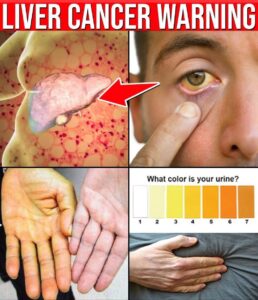Your liver is one of the most vital organs in the human body.
It acts as the body’s natural filter, removing toxins, supporting digestion, and regulating blood sugar levels.
Despite its resilience, the liver can develop serious health problems—one of the most concerning being liver cancer.

The challenge with liver cancer is that it often develops silently, with symptoms only appearing in later stages. That’s why learning to recognize the early warning signs can make a life-saving difference. Early detection not only improves treatment outcomes but also gives you the chance to take control of your health before the condition progresses.
In this article, we will explore 11 early symptoms of liver cancer you must never ignore, why they occur, and what to do if you notice them.
Why Early Detection of Liver Cancer Matters
The liver has a unique ability to regenerate and continue functioning even when part of it is damaged. While this is beneficial, it also means that liver cancer can grow unnoticed for a long time. By the time symptoms become severe, treatment options may be limited.
Paying attention to small but persistent changes in your health can help you identify issues before they escalate. Below are the most common early warning signs.
1. Unexplained Weight Loss
One of the first signs that something may be wrong with your liver is sudden, unplanned weight loss. If you are not dieting or exercising more but still losing pounds, it could indicate that your liver’s normal processes are being disrupted by cancer growth.
Why It Happens
The liver plays a key role in metabolism. When tumors interfere with its function, the body may struggle to properly use nutrients, leading to unintended weight loss.
2. Persistent Fatigue
Feeling constantly tired even after getting enough rest is another red flag. This type of fatigue is different from normal tiredness—it feels overwhelming and doesn’t improve with sleep.
Why It Happens
When the liver is affected by cancer, it cannot effectively detoxify the blood or regulate energy metabolism. This can leave you feeling drained and exhausted throughout the day.
3. Loss of Appetite
If you suddenly find yourself uninterested in food or feeling full after eating only small amounts, it could be related to liver problems.
Why It Happens
Cancer in the liver can interfere with digestion and hormone regulation, suppressing appetite and making it difficult to maintain a healthy diet.
4. Abdominal Pain or Swelling
Discomfort in the upper right side of your abdomen is one of the most noticeable symptoms. Some people also experience bloating or a feeling of heaviness.
Why It Happens
As the liver enlarges due to tumor growth, it presses against surrounding organs and tissues. This can cause persistent pain or visible swelling in the stomach area
5. Nausea and Vomiting
Frequent episodes of nausea or vomiting—especially when not linked to food poisoning or infection—may point to liver issues.
Why It Happens
The liver helps process waste and digestive fluids. When its function is compromised by cancer, toxins can build up in the body, triggering nausea and discomfort.
6. Yellowing of Skin and Eyes (Jaundice)
Jaundice is one of the most recognizable signs of liver dysfunction. It causes a yellowish tint in the skin and eyes.
Why It Happens
When the liver cannot properly process bilirubin, a yellow pigment from red blood cell breakdown, it accumulates in the body. This buildup results in visible discoloration of the skin and eyes.
7. Dark Urine and Pale Stools
Changes in the color of urine and stool may be early signs of liver cancer. Dark urine or light-colored stools should never be ignored.
Why It Happens
These changes usually indicate bile duct obstruction. Since the liver produces bile, cancer growth can block its flow, altering the natural color of body waste.
8. Itchy Skin
Unexplained and persistent itching—even without a visible rash—may also signal liver problems.
Why It Happens
When bile salts build up in the bloodstream due to poor liver function, they can irritate the skin, leading to chronic itching that does not improve with creams or medications.
9. Swelling in Legs and Ankles
Swelling in the lower body, also called edema, can be another subtle sign. If your shoes feel tighter or you notice puffiness in your ankles, it may be linked to liver dysfunction.
Why It Happens
When the liver cannot produce enough proteins like albumin, fluid leaks into surrounding tissues. This causes noticeable swelling, especially in the legs and ankles.
10. Easy Bruising or Bleeding
If you bruise more easily than before or notice frequent nosebleeds or bleeding gums, it may be related to impaired liver health.
Why It Happens
The liver is responsible for producing clotting factors. When cancer disrupts this function, the blood does not clot as it should, leading to bruising and bleeding with minimal injury.
11. Fever or General Malaise
A persistent low-grade fever or an overall feeling of being unwell (malaise) may also be an early indicator.
Why It Happens
The immune system often responds to cancer by raising body temperature. A consistent fever without an obvious cause could be your body’s way of signaling trouble in the liver.
When to Seek Medical Advice
Not every symptom listed above means you have liver cancer. However, if you notice one or more of these issues lasting for more than a few weeks, it’s essential to see a healthcare professional.
Early medical evaluation can help detect liver cancer at a more treatable stage. Doctors may recommend blood tests, imaging scans, or other diagnostic tools to confirm the condition.
Supporting Liver Health Naturally
Even if you don’t have symptoms, taking care of your liver should be a lifelong priority. Some practical steps include:
- Eating a balanced diet rich in fruits, vegetables, and whole grains.
- Limiting alcohol consumption.
- Avoiding excessive intake of processed foods and toxins.
- Staying physically active to support metabolism and weight management.
- Getting regular health check-ups, especially if you have risk factors like hepatitis, obesity, or a family history of liver disease.





